Tourism Planning and Policy: Social Power Structures in Rio de Janeiro
VerifiedAdded on 2023/06/03
|7
|2492
|352
Report
AI Summary
This report critically examines the influence of social power structures on tourism development, particularly in Rio de Janeiro, Brazil. It highlights the socio-cultural impacts of tourism, both positive and negative, and investigates whether tourism can serve as an agent for positive change. The report delves into issues such as sex tourism, human trafficking, and commercial sexual exploitation of children, linking these problems to social power dynamics and the exploitation of vulnerable populations. It argues that tourism, in its current form, can exacerbate social problems rather than alleviate them. The report concludes by proposing strategies for stakeholders, including governments, businesses, and NGOs, to promote responsible tourism practices and ensure that tourism contributes to genuine positive change, such as poverty reduction and improved living standards.
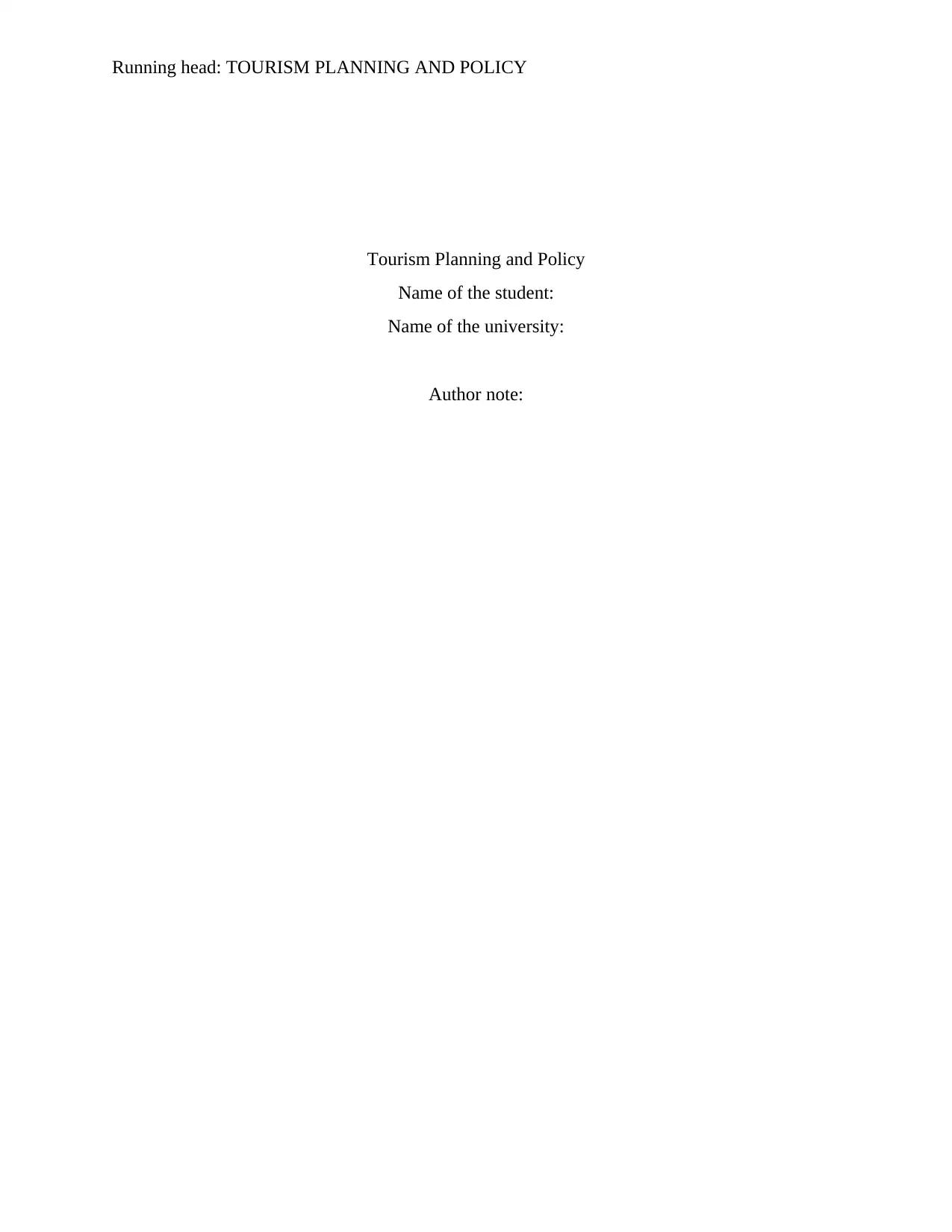
Running head: TOURISM PLANNING AND POLICY
Tourism Planning and Policy
Name of the student:
Name of the university:
Author note:
Tourism Planning and Policy
Name of the student:
Name of the university:
Author note:
Paraphrase This Document
Need a fresh take? Get an instant paraphrase of this document with our AI Paraphraser
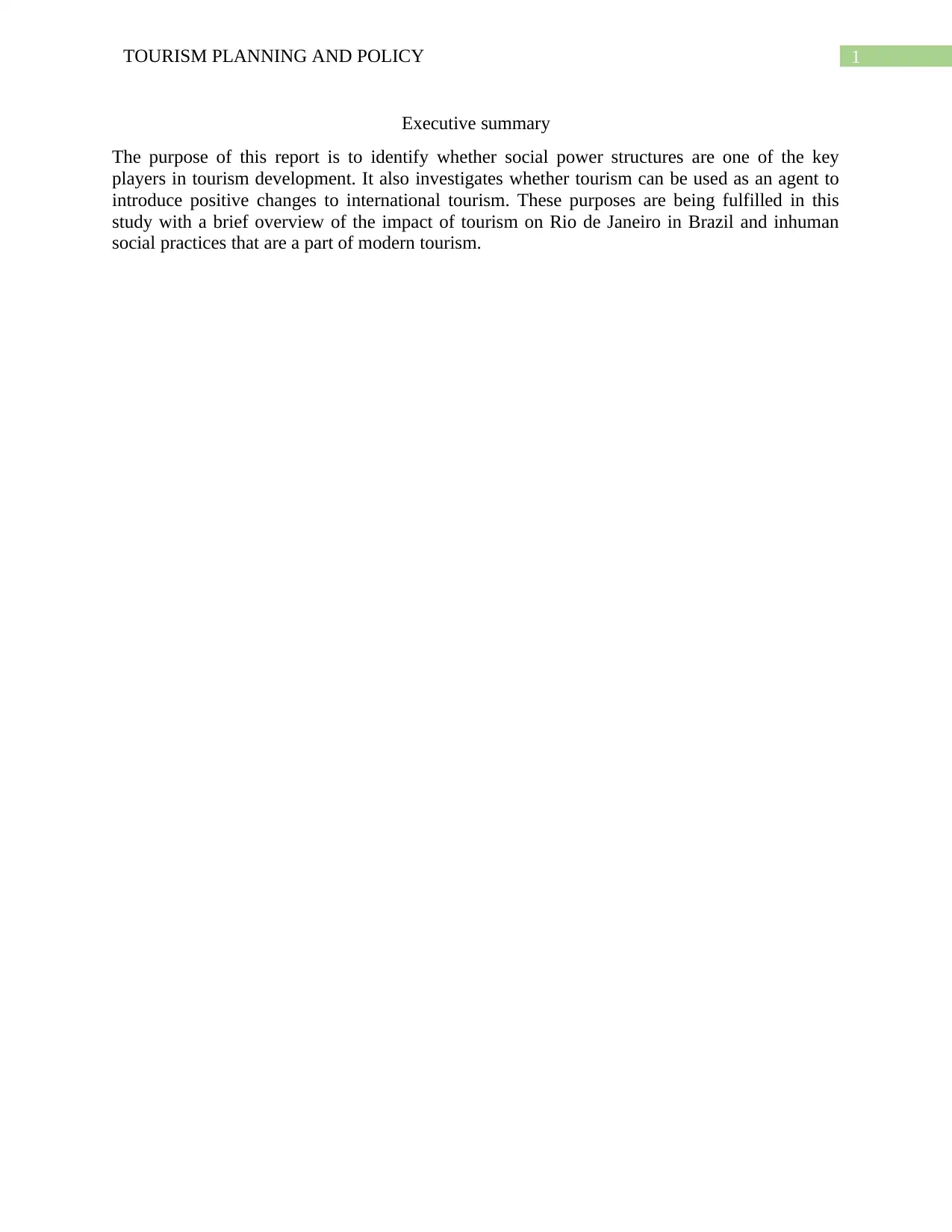
1TOURISM PLANNING AND POLICY
Executive summary
The purpose of this report is to identify whether social power structures are one of the key
players in tourism development. It also investigates whether tourism can be used as an agent to
introduce positive changes to international tourism. These purposes are being fulfilled in this
study with a brief overview of the impact of tourism on Rio de Janeiro in Brazil and inhuman
social practices that are a part of modern tourism.
Executive summary
The purpose of this report is to identify whether social power structures are one of the key
players in tourism development. It also investigates whether tourism can be used as an agent to
introduce positive changes to international tourism. These purposes are being fulfilled in this
study with a brief overview of the impact of tourism on Rio de Janeiro in Brazil and inhuman
social practices that are a part of modern tourism.
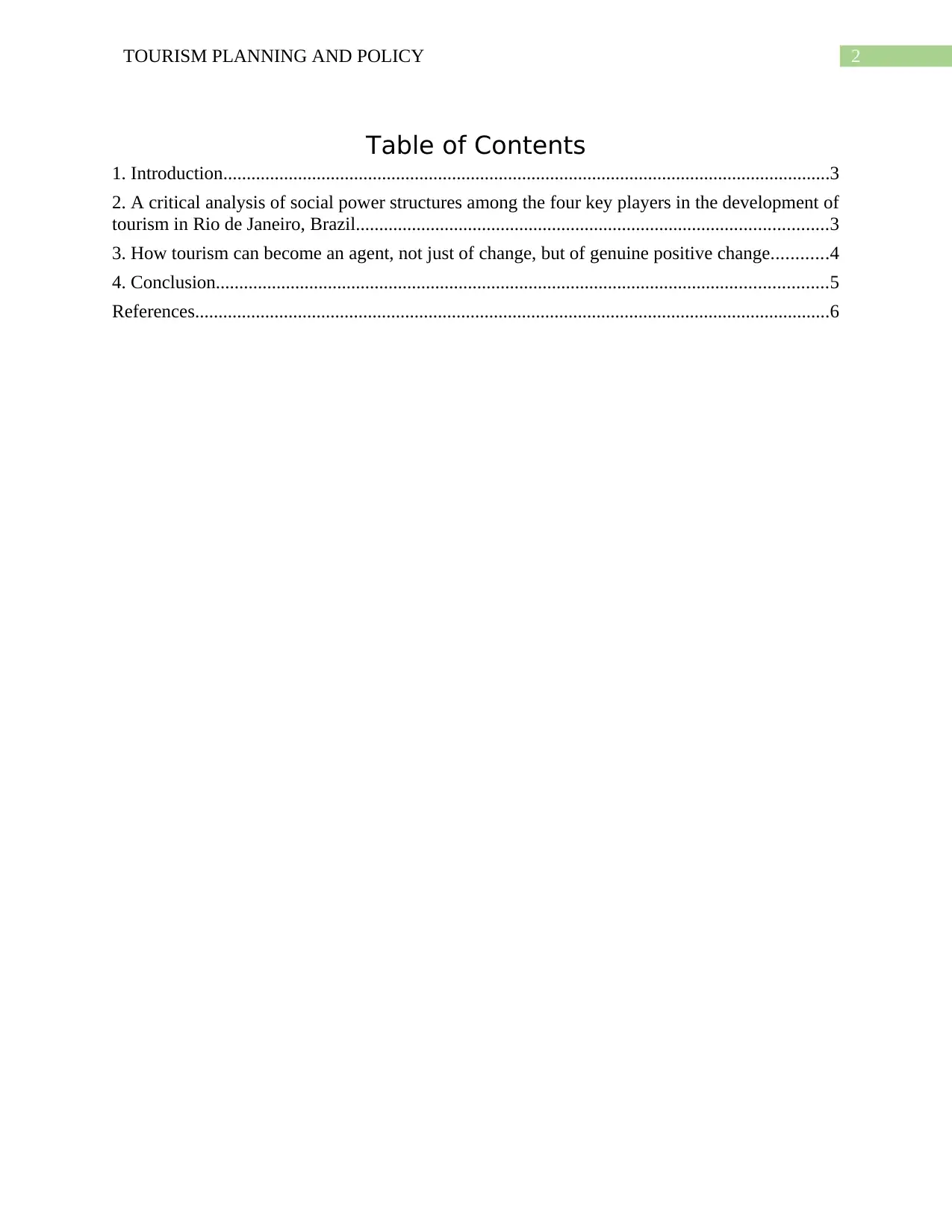
2TOURISM PLANNING AND POLICY
Table of Contents
1. Introduction..................................................................................................................................3
2. A critical analysis of social power structures among the four key players in the development of
tourism in Rio de Janeiro, Brazil.....................................................................................................3
3. How tourism can become an agent, not just of change, but of genuine positive change............4
4. Conclusion...................................................................................................................................5
References........................................................................................................................................6
Table of Contents
1. Introduction..................................................................................................................................3
2. A critical analysis of social power structures among the four key players in the development of
tourism in Rio de Janeiro, Brazil.....................................................................................................3
3. How tourism can become an agent, not just of change, but of genuine positive change............4
4. Conclusion...................................................................................................................................5
References........................................................................................................................................6
⊘ This is a preview!⊘
Do you want full access?
Subscribe today to unlock all pages.

Trusted by 1+ million students worldwide
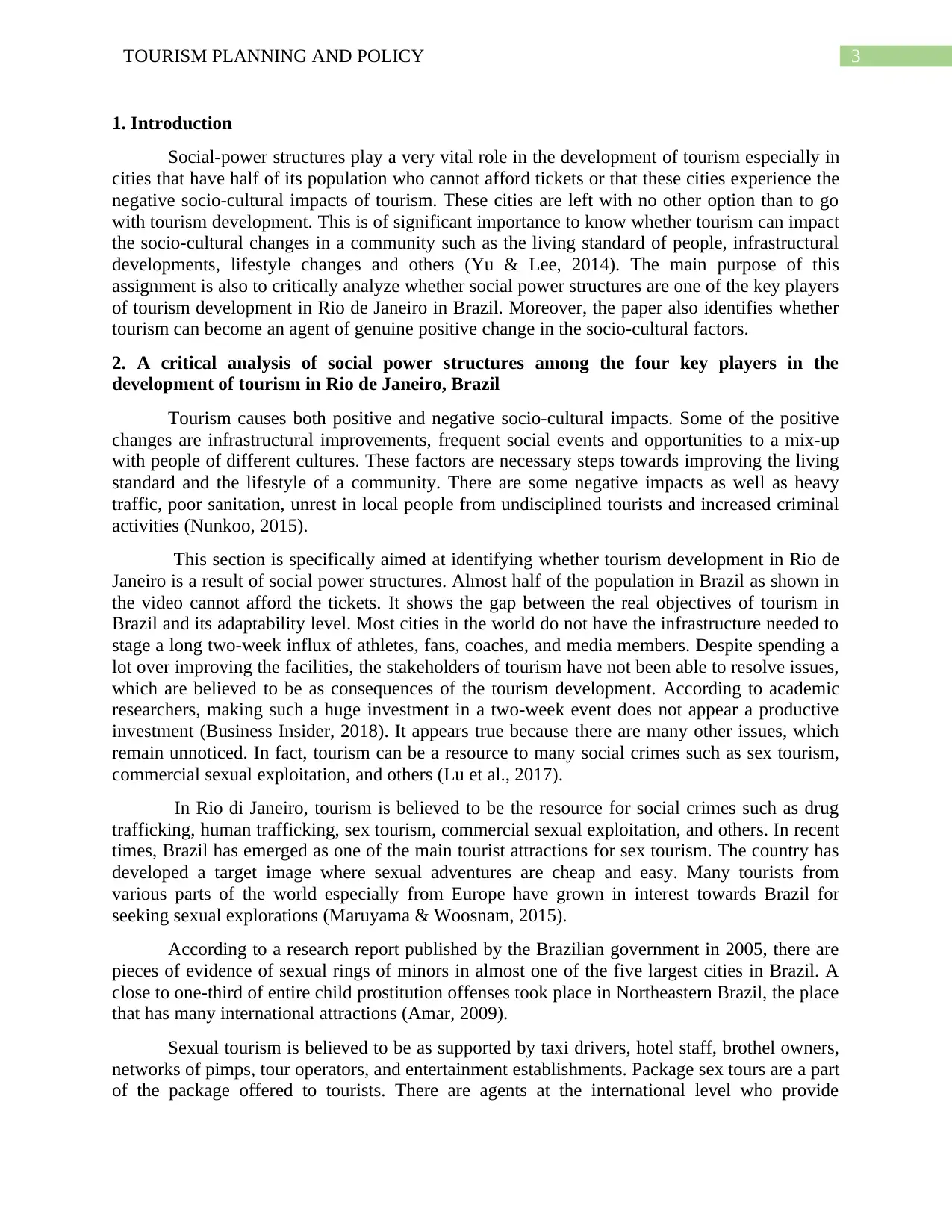
3TOURISM PLANNING AND POLICY
1. Introduction
Social-power structures play a very vital role in the development of tourism especially in
cities that have half of its population who cannot afford tickets or that these cities experience the
negative socio-cultural impacts of tourism. These cities are left with no other option than to go
with tourism development. This is of significant importance to know whether tourism can impact
the socio-cultural changes in a community such as the living standard of people, infrastructural
developments, lifestyle changes and others (Yu & Lee, 2014). The main purpose of this
assignment is also to critically analyze whether social power structures are one of the key players
of tourism development in Rio de Janeiro in Brazil. Moreover, the paper also identifies whether
tourism can become an agent of genuine positive change in the socio-cultural factors.
2. A critical analysis of social power structures among the four key players in the
development of tourism in Rio de Janeiro, Brazil
Tourism causes both positive and negative socio-cultural impacts. Some of the positive
changes are infrastructural improvements, frequent social events and opportunities to a mix-up
with people of different cultures. These factors are necessary steps towards improving the living
standard and the lifestyle of a community. There are some negative impacts as well as heavy
traffic, poor sanitation, unrest in local people from undisciplined tourists and increased criminal
activities (Nunkoo, 2015).
This section is specifically aimed at identifying whether tourism development in Rio de
Janeiro is a result of social power structures. Almost half of the population in Brazil as shown in
the video cannot afford the tickets. It shows the gap between the real objectives of tourism in
Brazil and its adaptability level. Most cities in the world do not have the infrastructure needed to
stage a long two-week influx of athletes, fans, coaches, and media members. Despite spending a
lot over improving the facilities, the stakeholders of tourism have not been able to resolve issues,
which are believed to be as consequences of the tourism development. According to academic
researchers, making such a huge investment in a two-week event does not appear a productive
investment (Business Insider, 2018). It appears true because there are many other issues, which
remain unnoticed. In fact, tourism can be a resource to many social crimes such as sex tourism,
commercial sexual exploitation, and others (Lu et al., 2017).
In Rio di Janeiro, tourism is believed to be the resource for social crimes such as drug
trafficking, human trafficking, sex tourism, commercial sexual exploitation, and others. In recent
times, Brazil has emerged as one of the main tourist attractions for sex tourism. The country has
developed a target image where sexual adventures are cheap and easy. Many tourists from
various parts of the world especially from Europe have grown in interest towards Brazil for
seeking sexual explorations (Maruyama & Woosnam, 2015).
According to a research report published by the Brazilian government in 2005, there are
pieces of evidence of sexual rings of minors in almost one of the five largest cities in Brazil. A
close to one-third of entire child prostitution offenses took place in Northeastern Brazil, the place
that has many international attractions (Amar, 2009).
Sexual tourism is believed to be as supported by taxi drivers, hotel staff, brothel owners,
networks of pimps, tour operators, and entertainment establishments. Package sex tours are a part
of the package offered to tourists. There are agents at the international level who provide
1. Introduction
Social-power structures play a very vital role in the development of tourism especially in
cities that have half of its population who cannot afford tickets or that these cities experience the
negative socio-cultural impacts of tourism. These cities are left with no other option than to go
with tourism development. This is of significant importance to know whether tourism can impact
the socio-cultural changes in a community such as the living standard of people, infrastructural
developments, lifestyle changes and others (Yu & Lee, 2014). The main purpose of this
assignment is also to critically analyze whether social power structures are one of the key players
of tourism development in Rio de Janeiro in Brazil. Moreover, the paper also identifies whether
tourism can become an agent of genuine positive change in the socio-cultural factors.
2. A critical analysis of social power structures among the four key players in the
development of tourism in Rio de Janeiro, Brazil
Tourism causes both positive and negative socio-cultural impacts. Some of the positive
changes are infrastructural improvements, frequent social events and opportunities to a mix-up
with people of different cultures. These factors are necessary steps towards improving the living
standard and the lifestyle of a community. There are some negative impacts as well as heavy
traffic, poor sanitation, unrest in local people from undisciplined tourists and increased criminal
activities (Nunkoo, 2015).
This section is specifically aimed at identifying whether tourism development in Rio de
Janeiro is a result of social power structures. Almost half of the population in Brazil as shown in
the video cannot afford the tickets. It shows the gap between the real objectives of tourism in
Brazil and its adaptability level. Most cities in the world do not have the infrastructure needed to
stage a long two-week influx of athletes, fans, coaches, and media members. Despite spending a
lot over improving the facilities, the stakeholders of tourism have not been able to resolve issues,
which are believed to be as consequences of the tourism development. According to academic
researchers, making such a huge investment in a two-week event does not appear a productive
investment (Business Insider, 2018). It appears true because there are many other issues, which
remain unnoticed. In fact, tourism can be a resource to many social crimes such as sex tourism,
commercial sexual exploitation, and others (Lu et al., 2017).
In Rio di Janeiro, tourism is believed to be the resource for social crimes such as drug
trafficking, human trafficking, sex tourism, commercial sexual exploitation, and others. In recent
times, Brazil has emerged as one of the main tourist attractions for sex tourism. The country has
developed a target image where sexual adventures are cheap and easy. Many tourists from
various parts of the world especially from Europe have grown in interest towards Brazil for
seeking sexual explorations (Maruyama & Woosnam, 2015).
According to a research report published by the Brazilian government in 2005, there are
pieces of evidence of sexual rings of minors in almost one of the five largest cities in Brazil. A
close to one-third of entire child prostitution offenses took place in Northeastern Brazil, the place
that has many international attractions (Amar, 2009).
Sexual tourism is believed to be as supported by taxi drivers, hotel staff, brothel owners,
networks of pimps, tour operators, and entertainment establishments. Package sex tours are a part
of the package offered to tourists. There are agents at the international level who provide
Paraphrase This Document
Need a fresh take? Get an instant paraphrase of this document with our AI Paraphraser
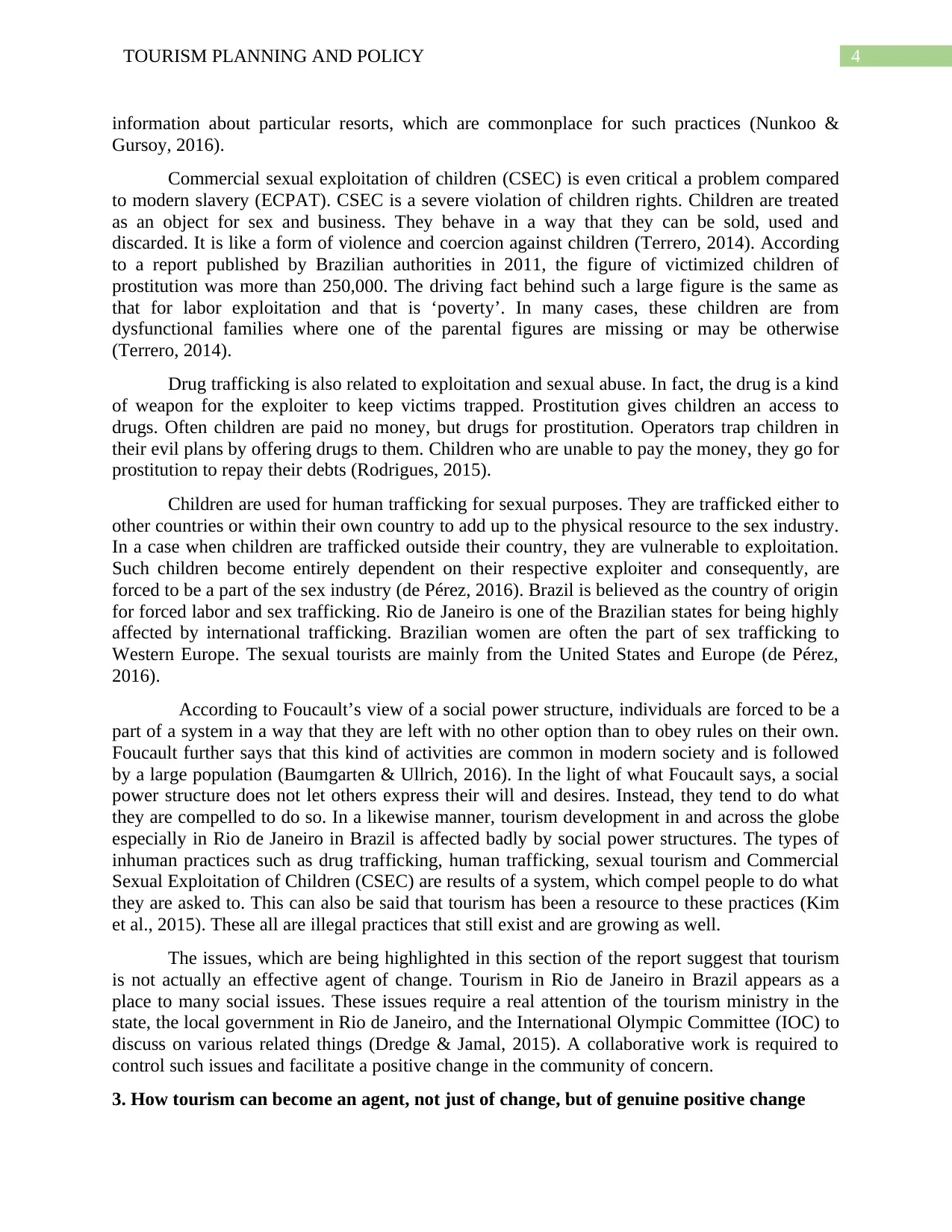
4TOURISM PLANNING AND POLICY
information about particular resorts, which are commonplace for such practices (Nunkoo &
Gursoy, 2016).
Commercial sexual exploitation of children (CSEC) is even critical a problem compared
to modern slavery (ECPAT). CSEC is a severe violation of children rights. Children are treated
as an object for sex and business. They behave in a way that they can be sold, used and
discarded. It is like a form of violence and coercion against children (Terrero, 2014). According
to a report published by Brazilian authorities in 2011, the figure of victimized children of
prostitution was more than 250,000. The driving fact behind such a large figure is the same as
that for labor exploitation and that is ‘poverty’. In many cases, these children are from
dysfunctional families where one of the parental figures are missing or may be otherwise
(Terrero, 2014).
Drug trafficking is also related to exploitation and sexual abuse. In fact, the drug is a kind
of weapon for the exploiter to keep victims trapped. Prostitution gives children an access to
drugs. Often children are paid no money, but drugs for prostitution. Operators trap children in
their evil plans by offering drugs to them. Children who are unable to pay the money, they go for
prostitution to repay their debts (Rodrigues, 2015).
Children are used for human trafficking for sexual purposes. They are trafficked either to
other countries or within their own country to add up to the physical resource to the sex industry.
In a case when children are trafficked outside their country, they are vulnerable to exploitation.
Such children become entirely dependent on their respective exploiter and consequently, are
forced to be a part of the sex industry (de Pérez, 2016). Brazil is believed as the country of origin
for forced labor and sex trafficking. Rio de Janeiro is one of the Brazilian states for being highly
affected by international trafficking. Brazilian women are often the part of sex trafficking to
Western Europe. The sexual tourists are mainly from the United States and Europe (de Pérez,
2016).
According to Foucault’s view of a social power structure, individuals are forced to be a
part of a system in a way that they are left with no other option than to obey rules on their own.
Foucault further says that this kind of activities are common in modern society and is followed
by a large population (Baumgarten & Ullrich, 2016). In the light of what Foucault says, a social
power structure does not let others express their will and desires. Instead, they tend to do what
they are compelled to do so. In a likewise manner, tourism development in and across the globe
especially in Rio de Janeiro in Brazil is affected badly by social power structures. The types of
inhuman practices such as drug trafficking, human trafficking, sexual tourism and Commercial
Sexual Exploitation of Children (CSEC) are results of a system, which compel people to do what
they are asked to. This can also be said that tourism has been a resource to these practices (Kim
et al., 2015). These all are illegal practices that still exist and are growing as well.
The issues, which are being highlighted in this section of the report suggest that tourism
is not actually an effective agent of change. Tourism in Rio de Janeiro in Brazil appears as a
place to many social issues. These issues require a real attention of the tourism ministry in the
state, the local government in Rio de Janeiro, and the International Olympic Committee (IOC) to
discuss on various related things (Dredge & Jamal, 2015). A collaborative work is required to
control such issues and facilitate a positive change in the community of concern.
3. How tourism can become an agent, not just of change, but of genuine positive change
information about particular resorts, which are commonplace for such practices (Nunkoo &
Gursoy, 2016).
Commercial sexual exploitation of children (CSEC) is even critical a problem compared
to modern slavery (ECPAT). CSEC is a severe violation of children rights. Children are treated
as an object for sex and business. They behave in a way that they can be sold, used and
discarded. It is like a form of violence and coercion against children (Terrero, 2014). According
to a report published by Brazilian authorities in 2011, the figure of victimized children of
prostitution was more than 250,000. The driving fact behind such a large figure is the same as
that for labor exploitation and that is ‘poverty’. In many cases, these children are from
dysfunctional families where one of the parental figures are missing or may be otherwise
(Terrero, 2014).
Drug trafficking is also related to exploitation and sexual abuse. In fact, the drug is a kind
of weapon for the exploiter to keep victims trapped. Prostitution gives children an access to
drugs. Often children are paid no money, but drugs for prostitution. Operators trap children in
their evil plans by offering drugs to them. Children who are unable to pay the money, they go for
prostitution to repay their debts (Rodrigues, 2015).
Children are used for human trafficking for sexual purposes. They are trafficked either to
other countries or within their own country to add up to the physical resource to the sex industry.
In a case when children are trafficked outside their country, they are vulnerable to exploitation.
Such children become entirely dependent on their respective exploiter and consequently, are
forced to be a part of the sex industry (de Pérez, 2016). Brazil is believed as the country of origin
for forced labor and sex trafficking. Rio de Janeiro is one of the Brazilian states for being highly
affected by international trafficking. Brazilian women are often the part of sex trafficking to
Western Europe. The sexual tourists are mainly from the United States and Europe (de Pérez,
2016).
According to Foucault’s view of a social power structure, individuals are forced to be a
part of a system in a way that they are left with no other option than to obey rules on their own.
Foucault further says that this kind of activities are common in modern society and is followed
by a large population (Baumgarten & Ullrich, 2016). In the light of what Foucault says, a social
power structure does not let others express their will and desires. Instead, they tend to do what
they are compelled to do so. In a likewise manner, tourism development in and across the globe
especially in Rio de Janeiro in Brazil is affected badly by social power structures. The types of
inhuman practices such as drug trafficking, human trafficking, sexual tourism and Commercial
Sexual Exploitation of Children (CSEC) are results of a system, which compel people to do what
they are asked to. This can also be said that tourism has been a resource to these practices (Kim
et al., 2015). These all are illegal practices that still exist and are growing as well.
The issues, which are being highlighted in this section of the report suggest that tourism
is not actually an effective agent of change. Tourism in Rio de Janeiro in Brazil appears as a
place to many social issues. These issues require a real attention of the tourism ministry in the
state, the local government in Rio de Janeiro, and the International Olympic Committee (IOC) to
discuss on various related things (Dredge & Jamal, 2015). A collaborative work is required to
control such issues and facilitate a positive change in the community of concern.
3. How tourism can become an agent, not just of change, but of genuine positive change
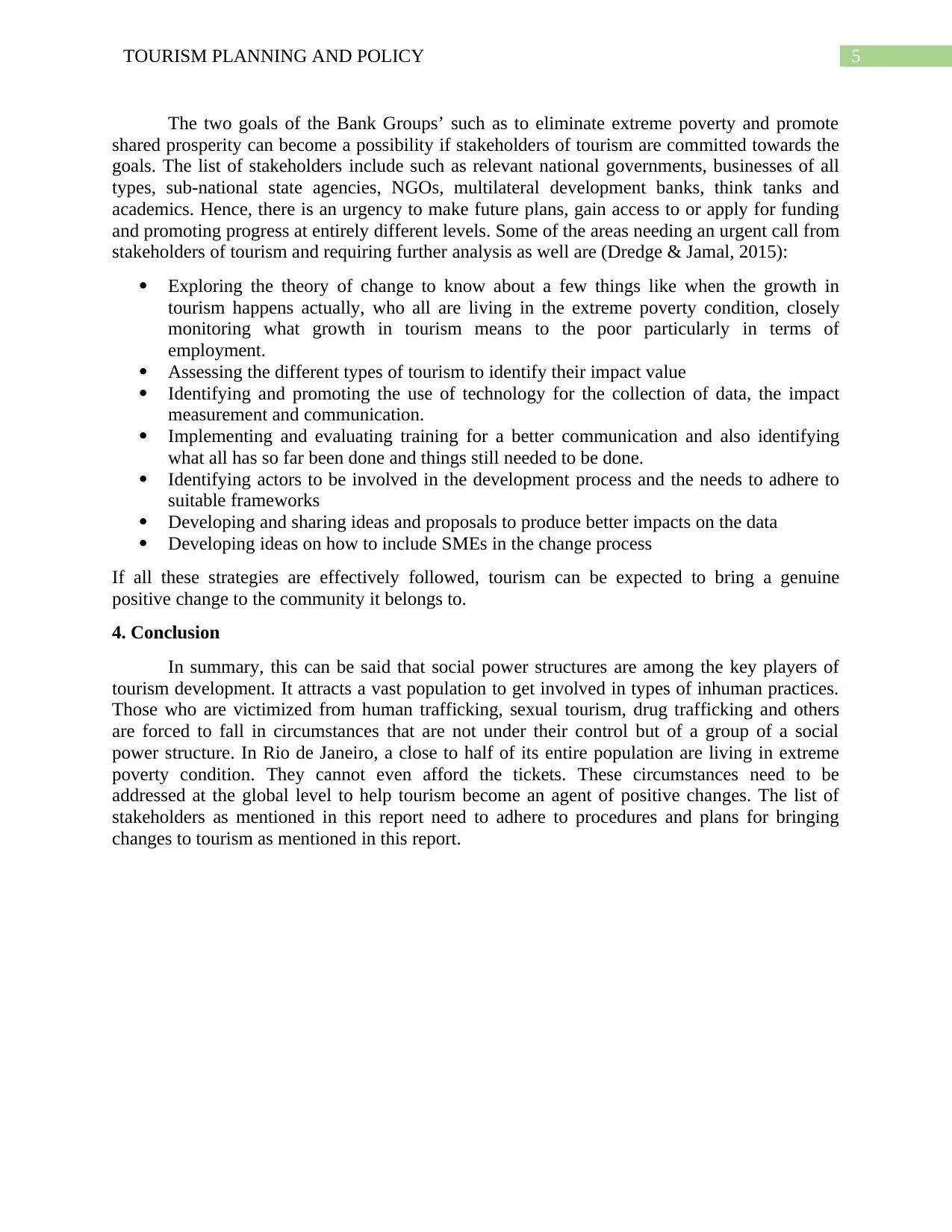
5TOURISM PLANNING AND POLICY
The two goals of the Bank Groups’ such as to eliminate extreme poverty and promote
shared prosperity can become a possibility if stakeholders of tourism are committed towards the
goals. The list of stakeholders include such as relevant national governments, businesses of all
types, sub-national state agencies, NGOs, multilateral development banks, think tanks and
academics. Hence, there is an urgency to make future plans, gain access to or apply for funding
and promoting progress at entirely different levels. Some of the areas needing an urgent call from
stakeholders of tourism and requiring further analysis as well are (Dredge & Jamal, 2015):
Exploring the theory of change to know about a few things like when the growth in
tourism happens actually, who all are living in the extreme poverty condition, closely
monitoring what growth in tourism means to the poor particularly in terms of
employment.
Assessing the different types of tourism to identify their impact value
Identifying and promoting the use of technology for the collection of data, the impact
measurement and communication.
Implementing and evaluating training for a better communication and also identifying
what all has so far been done and things still needed to be done.
Identifying actors to be involved in the development process and the needs to adhere to
suitable frameworks
Developing and sharing ideas and proposals to produce better impacts on the data
Developing ideas on how to include SMEs in the change process
If all these strategies are effectively followed, tourism can be expected to bring a genuine
positive change to the community it belongs to.
4. Conclusion
In summary, this can be said that social power structures are among the key players of
tourism development. It attracts a vast population to get involved in types of inhuman practices.
Those who are victimized from human trafficking, sexual tourism, drug trafficking and others
are forced to fall in circumstances that are not under their control but of a group of a social
power structure. In Rio de Janeiro, a close to half of its entire population are living in extreme
poverty condition. They cannot even afford the tickets. These circumstances need to be
addressed at the global level to help tourism become an agent of positive changes. The list of
stakeholders as mentioned in this report need to adhere to procedures and plans for bringing
changes to tourism as mentioned in this report.
The two goals of the Bank Groups’ such as to eliminate extreme poverty and promote
shared prosperity can become a possibility if stakeholders of tourism are committed towards the
goals. The list of stakeholders include such as relevant national governments, businesses of all
types, sub-national state agencies, NGOs, multilateral development banks, think tanks and
academics. Hence, there is an urgency to make future plans, gain access to or apply for funding
and promoting progress at entirely different levels. Some of the areas needing an urgent call from
stakeholders of tourism and requiring further analysis as well are (Dredge & Jamal, 2015):
Exploring the theory of change to know about a few things like when the growth in
tourism happens actually, who all are living in the extreme poverty condition, closely
monitoring what growth in tourism means to the poor particularly in terms of
employment.
Assessing the different types of tourism to identify their impact value
Identifying and promoting the use of technology for the collection of data, the impact
measurement and communication.
Implementing and evaluating training for a better communication and also identifying
what all has so far been done and things still needed to be done.
Identifying actors to be involved in the development process and the needs to adhere to
suitable frameworks
Developing and sharing ideas and proposals to produce better impacts on the data
Developing ideas on how to include SMEs in the change process
If all these strategies are effectively followed, tourism can be expected to bring a genuine
positive change to the community it belongs to.
4. Conclusion
In summary, this can be said that social power structures are among the key players of
tourism development. It attracts a vast population to get involved in types of inhuman practices.
Those who are victimized from human trafficking, sexual tourism, drug trafficking and others
are forced to fall in circumstances that are not under their control but of a group of a social
power structure. In Rio de Janeiro, a close to half of its entire population are living in extreme
poverty condition. They cannot even afford the tickets. These circumstances need to be
addressed at the global level to help tourism become an agent of positive changes. The list of
stakeholders as mentioned in this report need to adhere to procedures and plans for bringing
changes to tourism as mentioned in this report.
⊘ This is a preview!⊘
Do you want full access?
Subscribe today to unlock all pages.

Trusted by 1+ million students worldwide
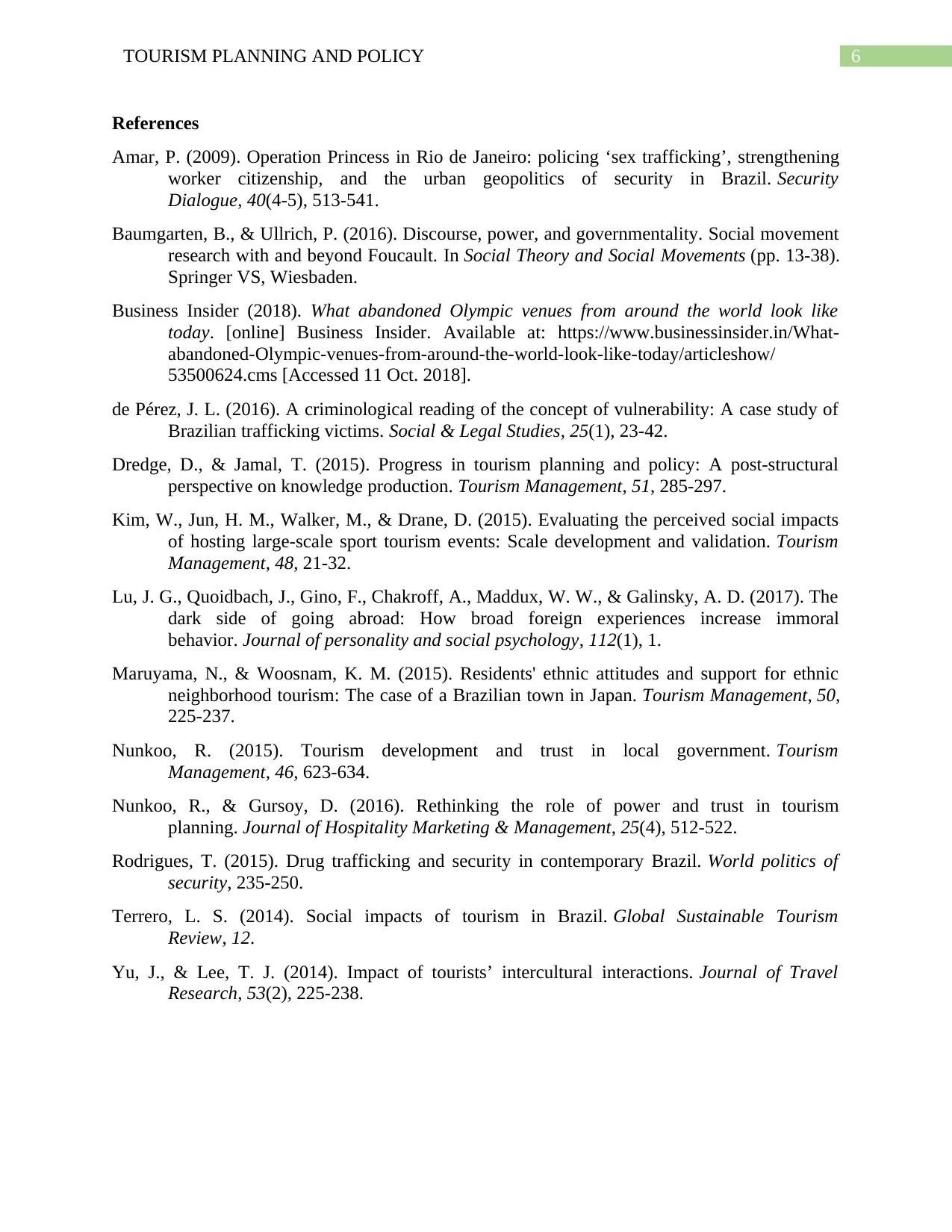
6TOURISM PLANNING AND POLICY
References
Amar, P. (2009). Operation Princess in Rio de Janeiro: policing ‘sex trafficking’, strengthening
worker citizenship, and the urban geopolitics of security in Brazil. Security
Dialogue, 40(4-5), 513-541.
Baumgarten, B., & Ullrich, P. (2016). Discourse, power, and governmentality. Social movement
research with and beyond Foucault. In Social Theory and Social Movements (pp. 13-38).
Springer VS, Wiesbaden.
Business Insider (2018). What abandoned Olympic venues from around the world look like
today. [online] Business Insider. Available at: https://www.businessinsider.in/What-
abandoned-Olympic-venues-from-around-the-world-look-like-today/articleshow/
53500624.cms [Accessed 11 Oct. 2018].
de Pérez, J. L. (2016). A criminological reading of the concept of vulnerability: A case study of
Brazilian trafficking victims. Social & Legal Studies, 25(1), 23-42.
Dredge, D., & Jamal, T. (2015). Progress in tourism planning and policy: A post-structural
perspective on knowledge production. Tourism Management, 51, 285-297.
Kim, W., Jun, H. M., Walker, M., & Drane, D. (2015). Evaluating the perceived social impacts
of hosting large-scale sport tourism events: Scale development and validation. Tourism
Management, 48, 21-32.
Lu, J. G., Quoidbach, J., Gino, F., Chakroff, A., Maddux, W. W., & Galinsky, A. D. (2017). The
dark side of going abroad: How broad foreign experiences increase immoral
behavior. Journal of personality and social psychology, 112(1), 1.
Maruyama, N., & Woosnam, K. M. (2015). Residents' ethnic attitudes and support for ethnic
neighborhood tourism: The case of a Brazilian town in Japan. Tourism Management, 50,
225-237.
Nunkoo, R. (2015). Tourism development and trust in local government. Tourism
Management, 46, 623-634.
Nunkoo, R., & Gursoy, D. (2016). Rethinking the role of power and trust in tourism
planning. Journal of Hospitality Marketing & Management, 25(4), 512-522.
Rodrigues, T. (2015). Drug trafficking and security in contemporary Brazil. World politics of
security, 235-250.
Terrero, L. S. (2014). Social impacts of tourism in Brazil. Global Sustainable Tourism
Review, 12.
Yu, J., & Lee, T. J. (2014). Impact of tourists’ intercultural interactions. Journal of Travel
Research, 53(2), 225-238.
References
Amar, P. (2009). Operation Princess in Rio de Janeiro: policing ‘sex trafficking’, strengthening
worker citizenship, and the urban geopolitics of security in Brazil. Security
Dialogue, 40(4-5), 513-541.
Baumgarten, B., & Ullrich, P. (2016). Discourse, power, and governmentality. Social movement
research with and beyond Foucault. In Social Theory and Social Movements (pp. 13-38).
Springer VS, Wiesbaden.
Business Insider (2018). What abandoned Olympic venues from around the world look like
today. [online] Business Insider. Available at: https://www.businessinsider.in/What-
abandoned-Olympic-venues-from-around-the-world-look-like-today/articleshow/
53500624.cms [Accessed 11 Oct. 2018].
de Pérez, J. L. (2016). A criminological reading of the concept of vulnerability: A case study of
Brazilian trafficking victims. Social & Legal Studies, 25(1), 23-42.
Dredge, D., & Jamal, T. (2015). Progress in tourism planning and policy: A post-structural
perspective on knowledge production. Tourism Management, 51, 285-297.
Kim, W., Jun, H. M., Walker, M., & Drane, D. (2015). Evaluating the perceived social impacts
of hosting large-scale sport tourism events: Scale development and validation. Tourism
Management, 48, 21-32.
Lu, J. G., Quoidbach, J., Gino, F., Chakroff, A., Maddux, W. W., & Galinsky, A. D. (2017). The
dark side of going abroad: How broad foreign experiences increase immoral
behavior. Journal of personality and social psychology, 112(1), 1.
Maruyama, N., & Woosnam, K. M. (2015). Residents' ethnic attitudes and support for ethnic
neighborhood tourism: The case of a Brazilian town in Japan. Tourism Management, 50,
225-237.
Nunkoo, R. (2015). Tourism development and trust in local government. Tourism
Management, 46, 623-634.
Nunkoo, R., & Gursoy, D. (2016). Rethinking the role of power and trust in tourism
planning. Journal of Hospitality Marketing & Management, 25(4), 512-522.
Rodrigues, T. (2015). Drug trafficking and security in contemporary Brazil. World politics of
security, 235-250.
Terrero, L. S. (2014). Social impacts of tourism in Brazil. Global Sustainable Tourism
Review, 12.
Yu, J., & Lee, T. J. (2014). Impact of tourists’ intercultural interactions. Journal of Travel
Research, 53(2), 225-238.
1 out of 7
Related Documents
Your All-in-One AI-Powered Toolkit for Academic Success.
+13062052269
info@desklib.com
Available 24*7 on WhatsApp / Email
![[object Object]](/_next/static/media/star-bottom.7253800d.svg)
Unlock your academic potential
Copyright © 2020–2026 A2Z Services. All Rights Reserved. Developed and managed by ZUCOL.




